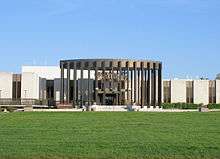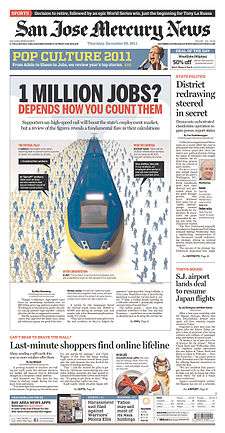San Jose Mercury News
|
| |
|
The December 22, 2011 front page of the San Jose Mercury News | |
| Type | Daily newspaper |
|---|---|
| Format | Broadsheet |
| Owner(s) | Digital First Media |
| Editor | David Butler |
| Founded | June 20, 1851 (as San Jose Weekly Visitor) |
| Language | English |
| Headquarters |
4 North Second Street San Jose, California 95190 U.S.[1] |
| Circulation |
At 2011: 527,568 daily 602,566 Sunday[2] |
| ISSN | 0747-2099 |
| OCLC number | 145122249 |
| Website | www.mercurynews.com |
The Mercury News (formerly San Jose Mercury News), often locally known as The Merc, is an American daily newspaper, published in San Jose, California. It is published by Bay Area News Group, a subsidiary of Digital First Media. The Mercury News encompasses all other Bay Area newspapers owned by Media News Group, including the Oakland Tribune, Contra Costa Times, Marin Independent Journal, San Mateo County Times, Santa Cruz Sentinel, and 10 other local daily newspapers, each of which are branded as "an edition of the San Jose Mercury News," which accounts for the newspaper's high circulation.
Formerly published as the San Jose Mercury News, Bay Area News Group announced in March 2016 that the newspaper would be re-branded as The Mercury News as part of a consolidation plan.[3] The Mercury News launched on April 5, 2016.
History


The San Jose Mercury was founded in 1851 as the San Jose Weekly Visitor, while the San Jose News was founded in 1883. In 1942, the Mercury purchased the News and continued publishing both newspapers, with the Mercury as the morning paper and the News as the evening paper. In 1983, the newspapers were merged into the San Jose Mercury News, with morning and afternoon editions. The afternoon edition was later abandoned.
The paper says that the name "Mercury" refers to the importance of the mercury industry during the California Gold Rush, when the city's New Almaden Mines (now Almaden Quicksilver County Park) were the largest producer of mercury in North America. The name has a dual meaning, as Mercury is the Roman messenger of the gods as well as the god of commerce and thieves, known for his swiftness, and the name Mercury is commonly used for newspapers without the quicksilver association.
Because of its location in Silicon Valley, the Mercury News has covered many of the key events in the history of computing.
Ridder bought the Mercury and News in 1952. Ridder merged with Knight to form Knight Ridder in 1974.
On March 13, 2006 The McClatchy Company announced their agreement to purchase Knight Ridder. McClatchy decided that it would be expedient to explore the immediate resale of the Mercury News.[4]
On April 26, 2006 it was announced that Denver-based MediaNews Group would buy the Mercury News.[5] However, on June 12, 2006, federal regulators from the U.S. Department of Justice asked for more time to review the purchase, citing possible anti-trust concerns over MediaNews' ownership of other newspapers in the region. Although approval by regulators and completion of MediaNews' acquisition was announced on August 2, 2006, a lawsuit claiming antitrust violations by MediaNews and the Hearst Corporation had also been filed in July 2006.[6]
The suit, which sought to undo the purchase of both the Mercury News and the Contra Costa Times, was scheduled to go to trial on April 30, 2007. While extending until that date a preliminary injunction which prevented collaboration of local distribution and national advertising sales by the two media conglomerates, U.S. District Judge Susan Illston on December 19, 2006 expressed doubt over the legality of the purchase.[7] On April 25, 2007, days before the trial was scheduled to begin, the parties reached a settlement in which MediaNews preserved its acquisitions.[8]
In September 2014 the Mercury News moved to downtown San Jose, leaving its purpose-built headquarters that opened in 1967. Cited as reasons for the move were that the printing presses were no longer on site and the staff reductions that had occurred over the years.[9]
Coverage and Contributors
The paper's local coverage and circulation is concentrated on the entire Bay Area, plus Santa Cruz County, yet excluding San Francisco and Sonoma County, which are thoroughly covered by the rival San Francisco Chronicle.
Tim Kawakami, a well-known sportswriter, has been a staff employee for many years. [10]
Awards
The newspaper has earned several awards, including two Pulitzer Prizes, one in 1986 for reporting regarding political corruption in the Ferdinand Marcos administration in the Philippines, and one in 1990 for their comprehensive coverage of the 1989 Loma Prieta earthquake. Assistant managing editor David Yarnold was also a Pulitzer Prize finalist in 2004 for a local corruption investigation.[11] The Mercury News was also named one of the five best-designed newspapers in the world by the Society for News Design for work done in 2001.
Controversies
In August 1996 the Mercury News published "Dark Alliance," a series of investigative articles by reporter Gary Webb. The series claimed that members of the Nicaraguan Contras, an anti-government group organized with the help of the Central Intelligence Agency, had been involved in smuggling cocaine into America to support their struggle, and as a result had played a major role in creating the crack-cocaine epidemic of the 1980s. The series sparked three federal investigations, but other newspapers such as the Los Angeles Times later published articles suggesting that the series claims were overstated. Executive editor Jerry Ceppos, who had approved the series, eventually published a column that acknowledged shortcomings in the series reporting, editing, and production, while maintaining the story was correct "on many important points."[12]
See also
References
- ↑ Carey, Pete (2014-06-12). "Mercury News announces move to downtown San Jose". San Jose Mercury News. Bay Area News Group. Retrieved 2014-10-19.
- ↑ "Circulation averages for the six months ended: 9/30/2010". Audit Bureau of Circulation. 2011-04-21.
- ↑ "Oakland loses Tribune, with paper folded into new East Bay Times". SFGate. March 1, 2016. Retrieved 19 April 2016.
- ↑ Seelye, Katharine; Sorkin, Andrew Ross (2006-03-13). "Newspaper Chain Agrees to a Sale for $4.5 Billion". The New York Times. Retrieved 2011-02-22.
- ↑ "McClatchy to sell four Knight Ridder newspapers for $1 billion" (PDF). The McClatchy Company/Media News Group. 2006-04-26. Archived from the original (PDF) on 2006-07-14. Retrieved 2011-02-22.
|archive-url=is malformed: timestamp (help) - ↑ Egelko, Bob (2006-12-20). "Hearst-MediaNews ruling extended". SFGate - San Francisco Chronicle. Hearst Communications. Retrieved 2011-02-22.
- ↑ Egelko, Bob (2006-12-20). "Hearst-MediaNews ruling extended". SFGate - San Francisco Chronicle. Hearst Communications. Retrieved 2011-02-22.
- ↑ Egelko, Bob (2007-04-25). "Hearst, MediaNews Group settle Reilly suit". SFGate - San Francisco Chronicle. Hearst Communications. Retrieved 2011-02-22.
- ↑ http://www.mercurynews.com/News/ci_26615094/Pizarro:-A-bittersweet-farewell-to-the-old-Mercury-News-building
- ↑ "Bio". San Jose Mercury News.
- ↑ White, Dana. (2001-02-24) "For the Birds" Westchester Magazine. Retrieved 2012-01-04.
- ↑ Ceppos, Jerry (1997-05-11). "To readers of our 'Dark Alliance' series". San Jose Mercury News. Archived from the original on November 19, 1997. Retrieved 2015-02-11.
External links
| Wikimedia Commons has media related to San Jose Mercury News. |
- www.mercurynews.com, the newspaper's official website
